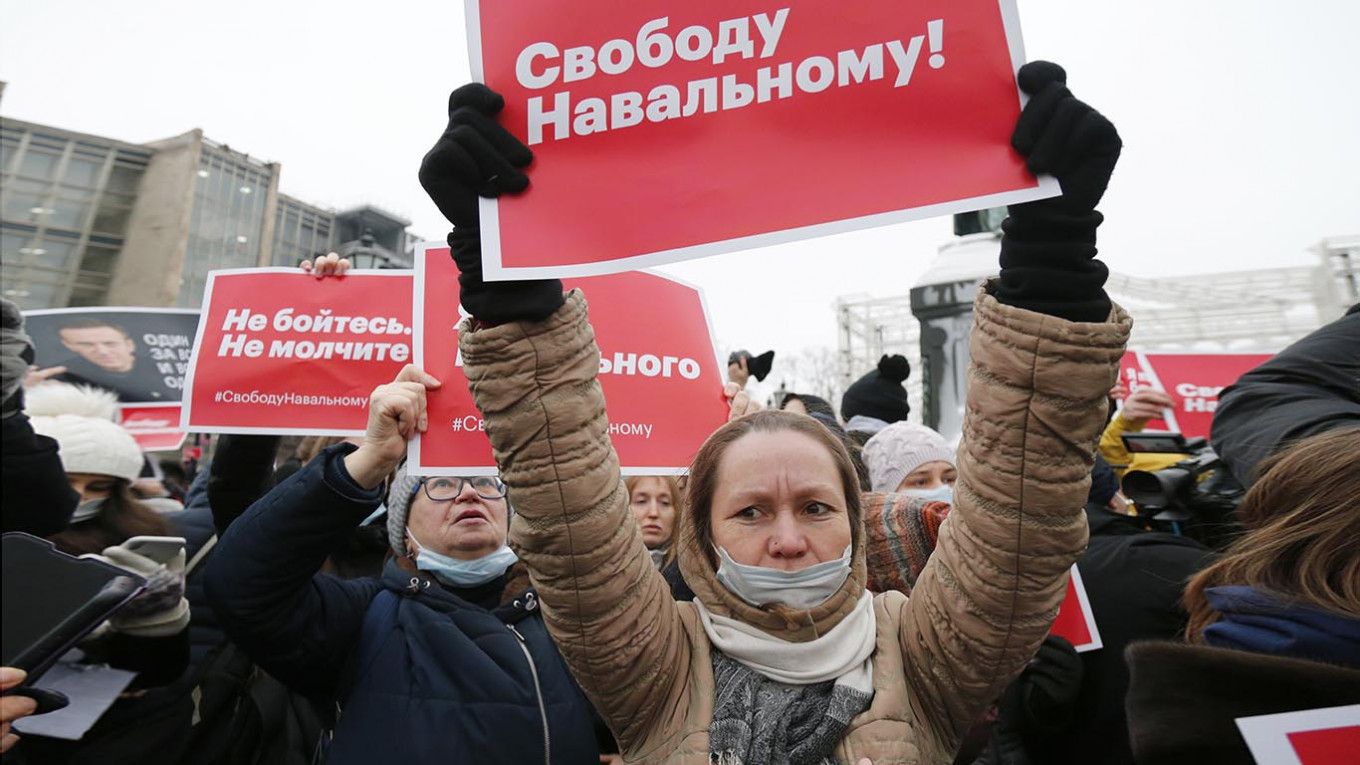When Kremlin critic Alexei Navalny was arrested upon his January return to Russia, his supporters and enemies alike turned their attention toward his wife Yulia Navalnaya. They prophesied that she was poised to replace her husband as Russia’s main opposition politician in a move that would mirror the political rise of Svetlana Tikhanovskaya in neighboring Belarus.
While Navalnaya herself would dismiss the calls to enter politics, that has not stopped women from emerging as a dominant force within Russia’s opposition. Navalny’s absence from the political landscape amid his recovery from Novichok poisoning and subsequent imprisonment turned the spotlight on his top female aides, including spokeswoman Kira Yarmysh and Anti-Corruption Foundation lawyer Lyubov Sobol.
This spotlight has been a double-edged sword: Both Yarmysh and Sobol were put under house arrest after they called on Russians to take to the streets for Navalny’s release on Jan. 23. They now face criminal charges of violating coronavirus-related bans on mass gatherings.
But beyond the most visible female figures in Navalny’s movement lies a growing and varied landscape of women in Russia’s political opposition.
Opposition deputy Yulia Galyamina, who also hosts a YouTube show that aims to spotlight female-driven activism in Russia, said the seemingly sudden rise of female opposition leadership is, in fact, a long-awaited shift of attention toward women who have played prominent roles in the opposition for years.
“There haven’t been any sudden changes,” Galyamina told The Moscow Times. “The number of women [in the opposition] remains roughly the same but they are being paid more attention to.
“There were, for example, quite a lot of women who participated in the 2017 [Moscow] municipal elections. They clearly did not just come off the street; they had been in activist roles before that.”
Patriarchal advantages
Women head nearly half of the Navalny team’s 37 regional headquarters and serve as key drivers of opposition activity in their regions. Some of them admit that their gender often plays to their personal as well as the regional movements’ advantage amid the patriarchal norms governing Russia’s security and political apparatuses.
“Because we live in such a patriarchal society, I actually feel safer compared to men [in the opposition],” head of Navalny’s St. Petersburg office Irina Fatyanova said. “The possibility that I will be attacked somewhere is much lower because beating up a woman could have a detrimental effect on the regime’s reputation.”
Anastasia Panchenko, Fatyanova’s counterpart who heads a female-majority office in Krasnodar, agreed with her colleague, saying local policemen are “less violent toward women than men,” although this treatment is rooted in deep sexism.
“I often hear things like ‘Why are you gals getting into this?’,” Panchenko said of her experiences getting arrested at opposition rallies.
“When I was in police custody, the head of the police station told me things like ‘You should be birthing children and making borscht instead,’ but I don’t really pay attention to that.”
That approach is mirrored by Liliya Chanysheva, who heads Navalny’s office in Russia’s republic of Bashkortostan. Chanysheva believes the contrast between her female leadership and regional head Radiy Khabirov’s macho-man persona plays to the opposition’s advantage.
Yelena Zdravomyslova, co-director of the gender studies program at the European University at St. Petersburg, explained that women’s visibility within the opposition could indeed turn some of its silent female empathizers into active supporters.
“New female political figures diversify the political landscape and can attract new attention to the movement. It shows that the movement is able to overcome archaic political norms and positions itself as progressive and innovative,” she said.
Zdravomyslova, however, cautions against oversimplifying that approach, noting that the “woman” label is applied to an extremely diverse group of people, some of which might be inclined to support a more conservative political mainstream “simply because there are fewer risks involved.”
‘Soft power’
In a country where female political leadership remains largely underdeveloped and women are still underrepresented in political institutions, women working in the opposition can both inspire the future generation by example and pressure leaders to bring the feminist agenda into mainstream political discourse, experts say.
“Historians would bring up the example of socialist parties,” Zdravomyslova explained, pointing to the zhenotdel, the women-focused political organization formed in the early days of the U.S.S.R. “Women there organized zhenotdels as soon as they assumed leadership roles.”
Though one should not expect the Navalny team’s anti-corruption agenda to pivot to radical feminism now that he has been jailed, some regional offices are already working to support the women’s rights agenda.
“We’re starting the conversation about women’s rights, the domestic violence law. Of course, the topic is not central [to our work] because we focus more on corruption but, nevertheless,” said Irina Fatyanova from Navalny’s St. Petersburg office.
Though strong female leaders have high potential in Navalny’s team, Fatyanova and her colleagues are quick to highlight that all the movement’s achievements are the result of a joint effort to create a gender-equal work environment.
“I would not say that everything is falling on women’s shoulders — that would be wishful thinking. But I would say that gradual changes are happening; politics are ceasing to be an exclusively male venture.”
A Message from The Moscow Times:
Dear readers,
We are facing unprecedented challenges. Russia's Prosecutor General's Office has designated The Moscow Times as an "undesirable" organization, criminalizing our work and putting our staff at risk of prosecution. This follows our earlier unjust labeling as a "foreign agent."
These actions are direct attempts to silence independent journalism in Russia. The authorities claim our work "discredits the decisions of the Russian leadership." We see things differently: we strive to provide accurate, unbiased reporting on Russia.
We, the journalists of The Moscow Times, refuse to be silenced. But to continue our work, we need your help.
Your support, no matter how small, makes a world of difference. If you can, please support us monthly starting from just $2. It's quick to set up, and every contribution makes a significant impact.
By supporting The Moscow Times, you're defending open, independent journalism in the face of repression. Thank you for standing with us.
Remind me later.







